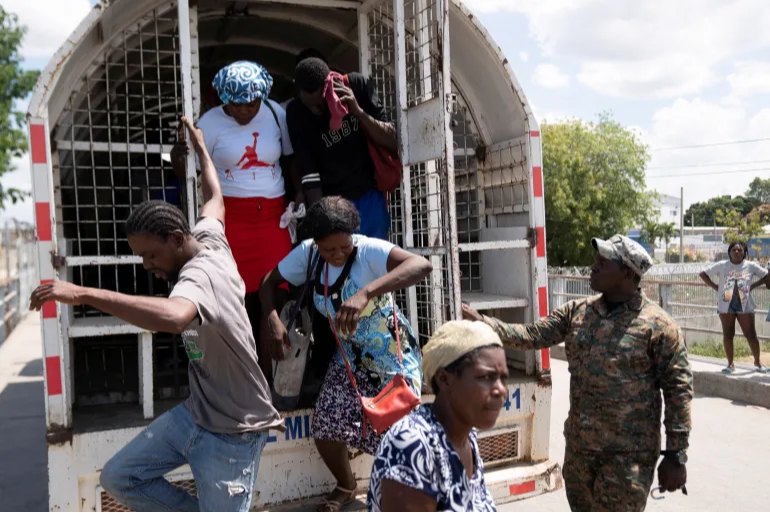
Haitian citizens get off a truck as they are deported to the border between Haiti and the Dominican Republic [Fran Afonso/Reuters]
Santo Domingo, October 3 (RHC)-- The Dominican Republic says it plans to expel as many as 10,000 Haitian migrants per week, despite a longstanding call from the United Nations to end forced returns to Haiti amid a surge in gang violence there.
Homero Figueroa, a Dominican presidential spokesman, said on Wednesday that the “operation aims to reduce the excessive migrant populations detected in Dominican communities.”
Figueroa added that the expulsions to Haiti, which shares a border with the Dominican Republic on the Caribbean island of Hispaniola, would begin “immediately”.
The announcement comes just days after the UN reported that at least 3,661 people had been killed in Haiti in the first half of 2024 amid the “senseless” gang violence that has engulfed the country.
Haitian leaders warned last week that they are “nowhere near winning” the battle against the armed groups, which for months have been carrying out attacks and kidnappings across the capital of Port-au-Prince and in other parts of the country.
The violence has internally displaced more than 700,000 Haitians, according to UN figures, and nearly half of the population — more than 5.4 million people — also faces acute hunger.
Haiti has reeled from years of violence as armed groups — often with ties to the country’s political and business leaders — have vied for control over territory. But the situation worsened dramatically at the end of February, when the gangs launched attacks on prisons and other state institutions in Port-au-Prince.
The surge in violence prompted the resignation of Haiti’s unelected prime minister, the creation of the transitional presidential council and the deployment of the UN-backed multinational police deployment, led by Kenya.
But the mission — formally known as the Multinational Security Support Mission (MSS) — has been under-funded and its officers under-resourced. So far, the deployment has done little to wrestle control away from the gangs, which are believed to control about 80 percent of Port-au-Prince.
The Dominican government said it took the decision to expel Haitian migrants who do not have immigration status in the country in light of the international community’s “slowness” in restoring stability in Haiti.
“We warned at the United Nations that either it and all the countries that had committed themselves [to helping Haiti] act responsibly in Haiti, or we will,” President Luis Abinader said.
Abinader has taken a hardline against migration from Haiti, expelling 250,000 undocumented Haitians in 2023 alone. The plan announced on Wednesday would more than double that number in a year — theoretically exceeding the number of Haitians actually living in the Dominican Republic. More than 495,815 Haitians call the Dominican Republic home, according to official statistics.
Rights groups have condemned the expulsions, accusing the Dominican authorities of enacting a racist immigration policy that invokes a wider, historical trend of anti-Haitian discrimination.
A majority of the population in the Dominican Republic identifies as mixed race, while Haiti has a predominantly Black population.
Haitian migration to the Dominican Republic began en masse following the US occupation of Haiti in 1915. But while many Haitians have lived in the country for decades, fear-mongering around the “Haitianisation” of Dominican society persists.
Some critics even accuse the Dominican government of racially profiling Black Dominicans in its expulsions.
Amid a wave of deportations in 2022, William Charpantier — a coordinator for MENAMIRD, a national roundtable for migrants and refugees in the Dominican Republic — told Al Jazeera that “all those who look like Haitians” were being rounded up in the streets and detained.
“These deportations have resulted in the separation of families. People with valid documents have been deported, people who were born here in the Dominican Republic have been deported,” Charpantier said at the time. “These aren’t deportations. It’s persecution based on race.”
As the violence and instability in Haiti escalates, the UN’s refugee agency (UNHCR) has urged governments around the world not to deport Haitians back to the country.
“Haitians’ lives, safety and freedom are threatened by a confluence of skyrocketing gang violence and human rights violations,” Elizabeth Tan, director of UNHCR’s division of international protection, said in March.
“UNHCR reminds States of the imperative to ensure Haitians who may need international refugee protection receive it,” Tan said. “We also reiterate our call to all States to not forcibly return people to Haiti, including those who have had their asylum claims rejected.”

